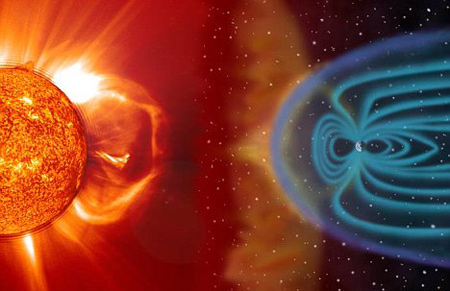Perforated hole on the Earth's shield
Themis satellite of the NASA Aerospace Agency (NASA) has discovered two large holes in the Earth's magnetic field, the material layer that can prevent the penetration of the solar wind.

The Earth's magnetic field is like an invisible shield that prevents the entry of the solar wind.Photo: Daily Mail.
Scientists have long known that Earth's magnetic field is capable of preventing extreme weather events in the universe like magnetic storms. However, like an old house, sometimes this layer of matter could not prevent the entry of solar wind (huge particles of charged particles coming from the Sun and moving at 1.6 million km / h).
The interaction between charged particles and the atmosphere of the Earth creates aurora phenomenon (colorful light appears in the sky at night). In addition, the solar wind can cause disturbance to satellite and ground communications systems.
The images sent by satellite Themis show two cracks in the Earth's magnetic field. Their existence causes the solar wind to pass through the Earth's atmosphere regularly.
Last summer, Themis discovered the existence of a layer of charged particles coming from the Sun in the outermost layer of the Earth's magnetic field. According to calculations by scientists, this ion layer has a thickness of 6,400 km or more. Although it only lasted for about an hour, this is the biggest "tear" in the Earth's magnetic field that we know so far.

Charged particles from the Sun collide with molecules and atoms in the Earth's atmosphere and stimulate these molecules to glow, creating many bright strips of light in the sky at two poles.This phenomenon is called aurora.
The solar wind is a constant danger to astronauts in the universe, but generally does not harm humans on the surface of the Earth.
Previously scientists believed that the solar wind simply penetrated the Earth's atmosphere when the magnetic axis of the Earth and the Sun faced each other. But the image from the satellite Themis shows the opposite: The solar wind passes through the green planet atmosphere at least 20 times when two magnetic axes are parallel.
Themis satellite data will help scientists predict the severity of magnetic storms and their impact on electrical networks, communications systems and satellite signals.
Themis satellite was launched into space to detect the origin of strong and short geomagnetic disturbances in the Earth's atmosphere.
- The invisible shield of the Earth
- Shredded 'origami' compact, folded like a paper crane but good bulletproof
- Video: Non-perforated bicycle tires can run over 8,000 km
- Next generation heat shield
- Perforated Punches: Small improvements, great efficiency
- Paint Shield: up to 99.9%
- The copper shield can protect the Earth from the solar storm
- Learn about the shield logo of Portugal
- Russia built a shield capable of crushing cosmic waste
- If you get a shield of Captain America, what will happen?
- Experimental shield of meteorites for Earth
- Discovering 'super black holes' is 12 times bigger than the Sun.
 Van Allen's belt and evidence that the Apollo 11 mission to the Moon was myth
Van Allen's belt and evidence that the Apollo 11 mission to the Moon was myth The levels of civilization in the universe (Kardashev scale)
The levels of civilization in the universe (Kardashev scale) Today Mars, the sun and the Earth are aligned
Today Mars, the sun and the Earth are aligned The Amazon owner announced a secret plan to build a space base for thousands of people
The Amazon owner announced a secret plan to build a space base for thousands of people What would happen if you dug a hole through the Earth and jumped in?
What would happen if you dug a hole through the Earth and jumped in?  Chilling discovery of cosmic object that almost brought the Earth to 'apocalypse'
Chilling discovery of cosmic object that almost brought the Earth to 'apocalypse'  The Sun goes into hibernation, will the Earth usher in a new ice age?
The Sun goes into hibernation, will the Earth usher in a new ice age?  Discovery of space object powerful enough to tear apart the Earth
Discovery of space object powerful enough to tear apart the Earth  NASA to test 'pneumatic brakes' for Mars lander
NASA to test 'pneumatic brakes' for Mars lander  Breakthrough discovery of planet with more water than Earth
Breakthrough discovery of planet with more water than Earth 